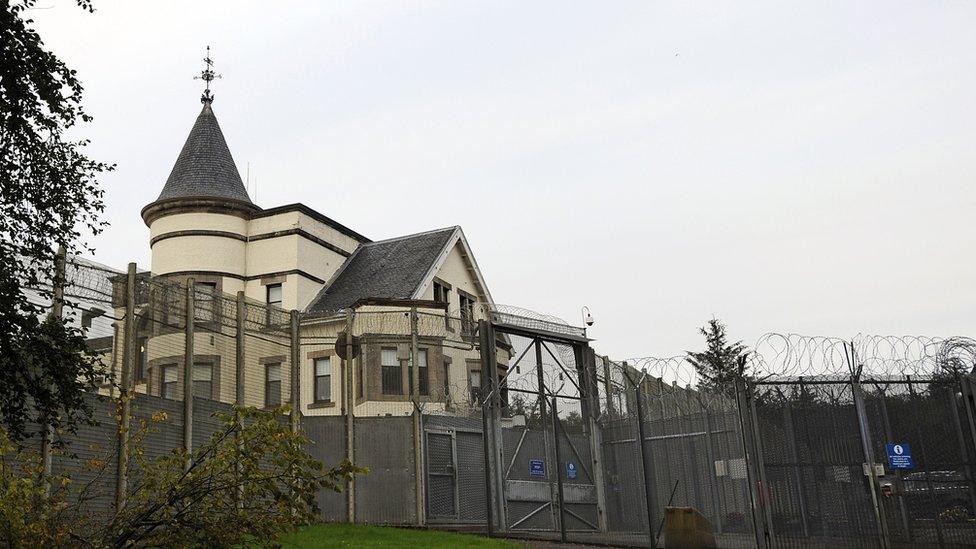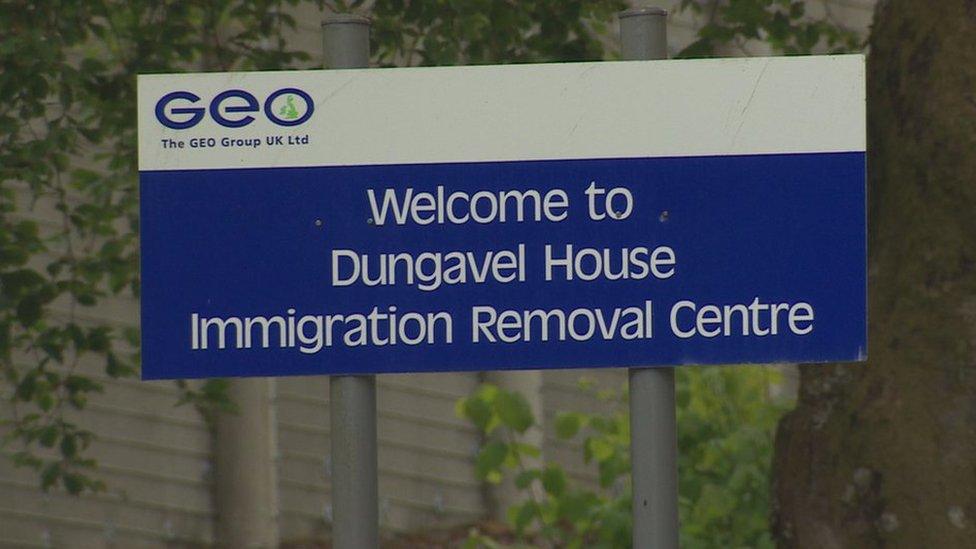Dungavel: Women detained alongside sexual violence risk men
- Published

Men who had a history of sexual violence against women had previously been held in a separate unit with controlled access to common areas
Female detainees at an immigration centre had to mix with men with a history of sexual violence against women, a report has found.
Women at Dungavel Immigration Removal Centre in South Lanarkshire were escorted around the site to make sure they were safe, inspectors said.
Before the pandemic, the men had been held in a separate unit, but "infection control arrangements" prevented this.
The Home Office said it took detainees' wellbeing "extremely seriously".
Inspectors visited Dungavel in July and August this year.
Charlie Taylor, HM Chief Inspector of Prisons, wrote a recommendation to the Home Office saying: "Detainees who pose risks to women should not be held in a centre with a mixed population."
The report said the centre's safer detention policy had improved with regards to care of women compared with the last inspection in 2018.
But the most recent report showed the matter was "not discussed substantively", other than stating that the centre was holding men who presented a risk to women, and that the monthly safer detention meeting was "poorly attended".
Twenty-one women had been held in the six months before the inspection, and 44% of front-line operational staff were women.
Inspectors said the equality policy was "underdeveloped" and there was no female detainee liaison officer.
The report also found detainees at Dungavel had been held for lengthy periods "with little prospect of being removed within a reasonable time".
It referenced one man who had been held for almost a year, although he had no travel documents and flights to his home country were "very restricted".
Some long-held detainees had also been assessed as "level 3 adults at risk" - the highest risk level - which meant the Home Office accepted that ongoing detention was having a negative impact on their health and wellbeing.
Others were held despite the Home Office accepting that they were victims of torture, the report said.
'Low morale'
Among staff generally, Mr Taylor said: "There remained a positive culture focused on detainee welfare, and this was reflected in many conversations we had with staff and in our observations of the way that staff and detainees related to each other around the centre."
However, he raised concerns over some staff members rushing their interaction with detainees and not spending enough time to explain the circumstances thoroughly of those being held.
Mr Taylor added: "Many detainee custody officers complained of low morale and understaffing.
"While we saw no evidence that this discontent had yet affected the treatment of detainees or safety in the centre, it had the potential to become a more significant concern as the population increased and required sustained leadership attention."
Inspectors said there had been a "much needed investment" in the centre, with "substantial refurbishment and decoration of many areas", including a welcoming visits area.
Mr Taylor said: "The centre remained fundamentally safe, providing a relaxed and calm environment where levels of violence were very low."
'Focus' on welfare
Mental health services at the centre were "good" and detainees had access to a range of activities including a library and a gym on site.
A spokesman for the UK Home Office said: "Immigration detention keeps dangerous people off the street while we organise their removal from the UK.
"We take the wellbeing of those detained in our care extremely seriously. Overall, independent inspectors concluded that Dungavel House was a safe environment with a clear focus on welfare.
"Despite significant pressures brought about by the pandemic, women were always accommodated in a separate unit and additional safeguards were put in place in communal areas, including staff escorting women."
- Published1 June 2019
